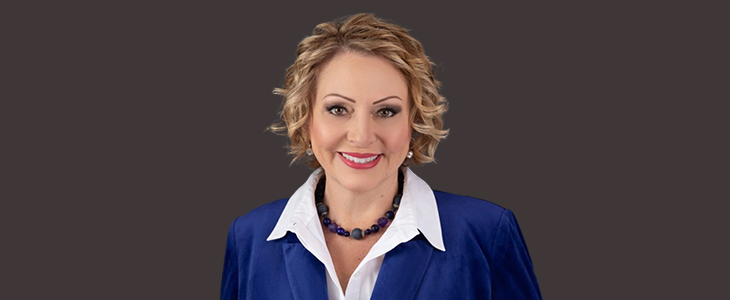
Have you ever wondered how Bank Secrecy Act (BSA) officers spend their working days and what they think about? Maybe you would love the opportunity to pick their brain on the issues at large. You are in luck! I had the pleasure of interviewing a seasoned colleague of mine, Rebecca (Becky) Schauer Robertson. In full disclosure, I had the privilege of working for Becky for almost 11 years. I owe a debt of gratitude to her professionally and was excited to get the opportunity to catch up with her. Setting the stage, Robertson is an executive vice president, BSA officer at Blue Ridge Bank, N.A., which is a $3 billion institution headquartered in Richmond, Virginia. She has 20 years’ experience as a BSA and Office of Foreign Assets Control (OFAC) officer and has worked in the financial industry for 28 years.
ACAMS Today (AT): So why BSA? How did you get here?
Rebecca Schauer Robertson (RSR): I have always felt regulatory compliance was of utmost importance. If you do something right from the beginning, it will be successful even though there may be hurdles or obstacles to overcome. BSA compliance is so important to aid law enforcement in their endeavors to thwart the bad actors. I knew being part of ensuring compliance with the BSA and OFAC would provide many opportunities for me to make a difference and impact the financial industry and the nation’s security in big and small ways. I was fortunate to be in the right place at the right time. At the beginning of my career, I managed a branch of a small finance company, transitioned into banking, starting on the teller line, and then moved into loan production, followed by regulatory compliance. A little under two years into my regulatory compliance career, I was asked to take on the roles of BSA and OFAC officers and build programs and teams from the ground up. I have been privileged to work with so many talented individuals and see them grow and develop in their careers, making me the leader I am today.
AT: What are your thoughts on the Corporate Transparency Act and pending beneficial ownership registry, which began January 1, 2024?
RSR: Where do I begin? I think the CTA was published before all the nuances were thought through. There was hope the beneficial ownership registry would lessen the burden on financial institutions (FIs) for customer due diligence; however, this doesn’t appear to be the case. Without solid guidance, banks are left with the unknown of what will be expected from them by their regulators. My fear is the beneficial ownership registry will create even more undue onus on banks, making them the “gatekeepers” to ensure that required entities have, in fact, registered before doing business with them. I suspect regulators will not be keen if an FI does not incorporate confirmation of registration into their procedures.
AT: What is the single biggest challenge you face now and why?
RSR: The biggest challenge now is finding the right balance of resources when resources don’t always mean people. Financial crimes teams are not considered revenue generators, but they sure do save revenue by keeping the bank in line with regulatory expectations and requirements. Financial crimes teams are essentially a “cost-save” center. With technology at the forefront now, identifying efficiencies that can be accomplished through robotic process automation or artificial intelligence is critical. However, these advances require an initial investment that more than likely will prove to pay off in the future. But sometimes, it’s hard to make that initial investment without seeing an immediate return on the investment.
AT: Do you think there are different challenges for community banks versus large banks?
RSR: Not necessarily, just on a different scale. All banks have to comply with the regulations. It’s just a matter of risk tolerance and scalability. Many community banks have small teams, which makes both accepting riskier businesses or customers and scalability challenges.
AT: How do community banks keep up with the ever-increasing technology curve?
RSR: It goes back to my previous comments on the biggest challenge. Community banks don’t always have a budget that will support the implementation of technology, so they are stuck in the technology curve. It’s important for banks to do their due diligence and identify “quick wins” where they can deploy strategies or partnerships that will prove to gain efficiencies quickly. After those tasks have been tackled, the bank can move on to more advanced options to tackle the bigger tasks and lessen the technology curve.
AT: What does the future look like in BSA?
RSR: I’m hopeful with the issuance of the AML/counter-terrorist financing National Priorities, regulatory expectations will shift more to align with the true intent of the BSA to identify and report unusual/suspicious activity. So much of what anti-financial crime professionals do is check boxes. The resources they do have must be focused on those items, leaving a lot of room for improvement in analysis, strategy identification and implementation, and reporting of what is truly suspicious.
AT: What advice would you give to your younger self?
RSR: Get the regulatory requirements “right” before adding “nice-to-haves” into policies/procedures/processes. The key is to set teammates up for success from the inception of a relationship throughout the life of the relationship. Don’t accept moving forward with the implementation of policies/procedures/processes, or even systems, if they don’t set the stage for success right out of the gate. It’s more costly to fix something after the fact, as opposed to taking the time or even spending the money to get it right from the beginning.
AT: I think there is so much great insight packed into these answers. This is a constantly evolving space and it takes strong leadership and vision to ensure success through all the changes on the horizon. I want to thank Becky Schauer Robertson again for her time and input. Hopefully, there is something in here that each reader can learn from or, at the very least, identify with in their day-to-day fight against financial crimes.
Interviewed by: Carl Francois, senior vice president, BSA and fraud officer, Southern First Bank, ![]()










